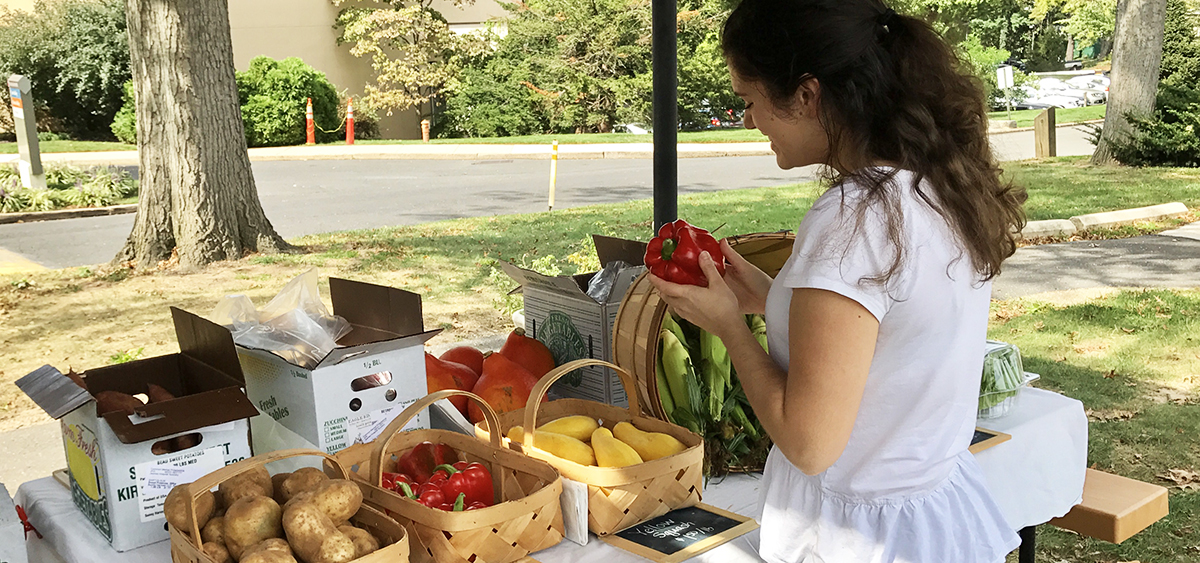
How to Get All the Fruits and Vegetables You Need During Cancer Care
-
It’s no secret that a diet filled with plenty of nutrient-packed produce is important for good health. But you may not know this: “Eating lots of fruits and veggies is especially important when you’re fighting cancer,” said Tara Mauro, RD, CSO, a registered dietitian at Fox Chase Cancer Center and a certified oncology specialist.
That’s because cancer treatment places considerable nutritional demands on your body. You need the nutrients and calories provided by healthy foods like produce for energy and healing. What’s more, “evidence suggests that continuing to eat a diet rich in plant-based foods after treatment may help reduce the risk of cancer coming back,” Mauro said.
What makes produce so protective? Fruits and vegetables are loaded with vitamins, minerals, antioxidants, and naturally occurring substances called phytochemicals that help defend against cancer. Phytochemicals—which give plants their color, aroma, and flavor—may help:
- Slow the growth rate of cancer cells and even stop them from reproducing
- Stimulate the immune system
- Control hormones
Your daily goal
To get the full benefits of produce, the American Cancer Society recommends eating at least 2 ½ cups of fruits and vegetables every day.
Choose a variety of produce with a rainbow of different colors, such as dark green, purple, orange, yellow, and red. Brightly colored produce is often the best source of phytochemicals.
“And unless your oncologist tells you otherwise, stick to food—not supplements,” Mauro emphasized. “The vitamins, minerals, and phytochemicals in supplement form may not be as easily absorbed as those from food. Even more important, some supplements can interfere with certain cancer treatments.”
Easing eating problems
Despite your best intentions, cancer itself and the side effects of treatment may cause eating problems that make it challenging to get enough fruits and vegetables in your diet. Here’s a look at five common cancer treatment side effects, along with tips from Mauro on how to ease them.
- Bowel changes. If you have diarrhea, steer clear of produce that’s high in insoluble fiber, such as dried fruits and raw fruits and veggies. But eat more produce that’s rich in soluble fiber and potassium, like applesauce, bananas, and sweet potatoes. For constipation, eat more produce of any kind every day, especially raw fruit with skin and seeds, dried fruit, and raw veggies.
- Dry mouth. Tart food and drinks may help you make more saliva. So, sip cranberry juice that’s 100% fruit juice, lemonade, or water flavored with citrus fruit. “That’s unless your mouth is sore, since tart foods can make it hurt more,” Mauro said. Suck on soothing frozen fruits too—for example, whole grapes and melon balls.
- Sore mouth. Pamper yours with soft, easy-to-eat produce—such as steamed spinach, a ripe mashed banana, a fruit or veggie smoothie, or any produce that’s pureed. And skip produce that can irritate your mouth, including produce that’s acidic, hard to chew, or seasoned with hot spices, salt, or vinegar.
- Nausea. “Shy away from produce that’s prepared in a greasy, spicy, or overly sweet way—it may not be tolerated while you’re struggling with nausea.,” Mauro cautioned. And eat small amounts of produce (and all foods) more often.
- Unintended weight loss. Top produce with some concentrated calories, such as nuts, seeds, peanut butter, grated cheese, or dried fruit. Add your favorite fruit to an oral nutrition supplement like Boost or Ensure.
At Fox Chase, our highly skilled team of registered dietitians can answer any further questions you may have about good nutrition—before, during, or after cancer treatment. To schedule an appointment with a dietitian, please call 215-728-2600.
Get more information about overcoming nutrition hurdles during cancer treatment.
